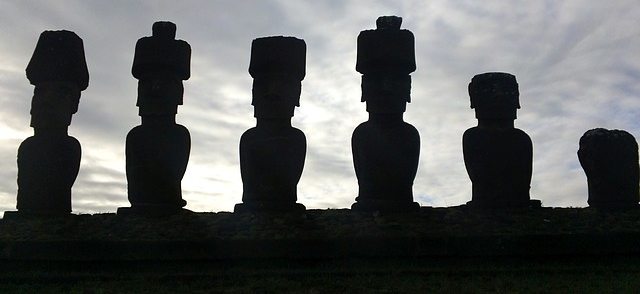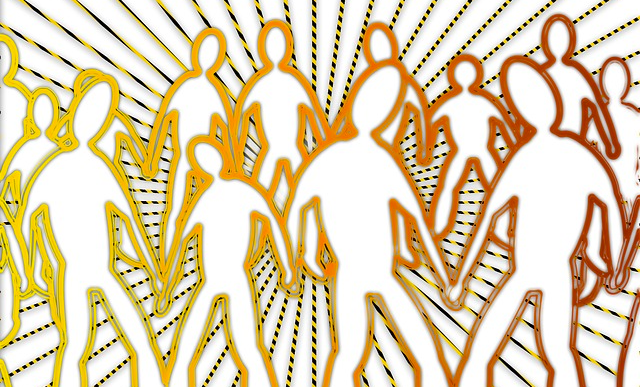
Many, many years ago, I noticed American politics often boiled down to blaming things on God, Darwin, Or History. Later it came to me that, in some ways, worldbuilders did this as well.
These are three crutches we use rather poorly in our worldbuilding. Three excuses that let us hand-wave good worldbuilding and thinking, and shovel torpes in. We may not even realize we do it.
(Though if you think about it you’re probably being a bit lazy. It’s OK, everyone is now and then.)
Let’s look at how these excuses get us lazy – and make poor worldbuilding. (more…)

(Way With Worlds is a weekly column on the art of worldbuilding published at Seventh Sanctum, Muse Hack, and Ongoing Worlds)
So last column I talked about stereotypes in creating races. Mostly it was:
- Don’t do it.
- Be sure not to mix up culture versus racial/species traits.
- Really, don’t do it.
- Did I mention conflating culture and biological traits really is bad?
However there’s a specific kind of stereotyping of races I want to call out in worldbuilding. One that’s insidiuous in real life and in fictional world creation. One that often goes unexplored.
The Positive Stereotype. (more…)

And welcome to the column with Most Controversial Sounding Title yet. Which, much like my columns on sex, is probably going to be far more pedestrian than expected. Which is good in this case.
What we’re going to talk about here is our races (in this case species) and races (the distinct groups within species) and culture.
Yeah, I’m gonna keep it clinical if I can. (more…)

(Way With Worlds is a weekly column on the art of worldbuilding published at Seventh Sanctum, Muse Hack, and Ongoing Worlds)
Sentient races (which I’m adapting in the “species” sense) are almost certainly going to be very adaptable. They are going to learn, change, grow, alter, and evolve – even as individuals. The child of today is nothing like the adult of tomorrow, just as the engineer of today is not the engineer of 200 years ago.
Adaption is, in many ways, the very definition of intelligence: taking in, processing, and using information. The ability to be aware, to think, is what sentience is. Without it, one’s really a machine, even if a biological one.
So if you’re writing sentient races (or species, ugh, I keep hating to differentiate-yet-not here), they’reprobably going to be adaptable. (more…)

And now, with the issue of race and species cleared up by largely just giving up (and using race for everything, including species), let’s talk designing races. Please note that in this case I will discuss race as an inclusively interbreeding, defined group – essentially species, as noted earlier.
Now I’ve covered some of this under previous columns on writing intelligent life – which I assume is largely what we’re covering here. In this case, we’re going to get into the nitty gritty about race creation.
Races start with the setting. Before you “run the race” you need to know the landscape.
OK, not the best joke, stick with me here. (more…)

It gets complicated.
Building “races” is a big thing in worldbuilding, especially in the areas of Science Fiction and Fantasy. People craft epicly different alien races. Games have different stats for the “player races.” Everyone seems happy when some fantasy world has Not Just Another Elf since so many races seem the same.
So if you’re worldbuilding, there’s a chance you need to create races. That’s the problem – when we talk about worldbuilding races, we’re not always talking races. If I’m going to talk race-creation I need to clarify what we’re talking about
We’re probably not talking about what you think we are. (more…)

A lot of my discussions on world building here involve solo efforts, single-person worldbuilding. I’m pretty much speaking to you as a “you” because . . . well that’s my chosen audience focus; single readers and solo world builder. But I’d be remiss if I didn’t take some time to discuss group world building efforts.
Group world building is actually an activity a lot of us engage in. We may do it as part of a defined team, or be a Game Master who takes a lot of player input. We might be running a shared RP, or we may be just having an idea jam at a convention. I don’t think we do it as often as solo world building, but we do it.
We might not even realize we’re doing it, we just think of “well we’re cooperating” or “she’s helping me out.”
So I wanted to take some time to discuss group world building – it’s advantages and challenges. I’ve been there as well, as have many of my friends, and I figure it’s worth exploring.
Besides, maybe you’ve not considered it and it might be for you . . . (more…)

(Way With Worlds is a weekly column on the art of worldbuilding published at Seventh Sanctum, Muse Hack, and Ongoing Worlds)
I love worldbuilding. You can kind of tell by how I wrote and now rewrite a huge series of columns on the subject. A lot of this is how-to, or advice, or exploration, but I’d like to talk ethics.
Not making ethics in your world. The ethics of good worldbuilding and what you should do as a world builder and author/creator.
This may sound a bit corny. There’s ethical issues to doing good worldbuilding? However, stick with me – there’s a reason. Let’s talk commitment and promises.
Managed Commitment
I’m a Project and Program Manager, which if you’re not familiar with, means roughly I’m a specialist in organizing and directing things and I’m certified to do it. That certification, the PMP, indicates I not only had training and took a test, it is also something I have to maintain and keep up. It represents a strong commitment to what I do.
What I do is of an ethical nature. People trust me, due to my titles and career and certification, to do certain things right.
Being a worldbuilder is much like this. When you take on making a world, when you are a writer/creator, that suggest there’s certain things you’r committed to, which I’ll explore below. You’re expected to deliver on them by your audience. To not do this means you don’t meet commitments you’ve made. In short, if you claim to be a worldbuilder and fail, it’s an ethical lapse.
If you’re going to accept the mantle of a worldbuilder and a writer, then you are making promises, and I take this very seriously. Probably I’m bitter over some bad worldbuilding promises, but still.
Let’s look at what you promise.
Worldbuilding Promises There’s Actually A World
Ever read a story where you could tell the author was making up the setting as they went along? You know that horrible, mushy feeling that there’s no “there” there? Yeah, I’m sure you have. It was awful.
Sometimes it even gets to that bizarre place when you realize a story that has shallow, objectionable, or stupid content has more of a world setting than something arguably high-class or good. It’s an unsettling disconnect (and one I’ve experienced more than once), but it’s a reminder that you expect there’s something to connect to, not a disconnected pile of stuff. Even if the tale told in it is awful
So when you write, when you create a world you are promising that yes, there is a setting there. Something people can rely on, understand, and enjoy. A good world promises there’s something people can count on to be there – which helps them understand and enjoy the tales told within.
Claim to be a worldbuilder? You’re promising a world. You made a commitment to deliver.
Worldbuilding Promises The World Has Rules
When you build a world, you’re claiming that it has identifiable components; rules that people can understand and make sense of. Magic requires mana, faster-than-light-travel produces intermittent time dilation, and this law firm makes a lot of money due to a contract. This helps make the world comprehendible – there is a world there and now there are components to “hold on to,” to grasp narrative and meaning.
A building has windows, doors, hallways, and so on. It has materials that have certain affects and traits. Your world has certain rules as well, rules that compose the larger setting.
Rules may not necessarily be communicated directly to the reader/player or however people experience your world, but they should be there. A reader/player who digs deep enough should at least have an idea that something is going on (or at least a good delusion that they got it when they missed the real rules).
A world without rules is really just you yanking things out of the air. Nothing can be counted on or relied on – and in turn you’re not world building but pondering,r anting, or rambling. You might be good at it, but still – in the end there’s no rules and no world.
You promise there’s a set of rules to the world.
Worldbuilding Promises The Rules Will Be Followed
Of course rules don’t mean anything if you don’t follow them. When you world build, you promise to follow the rules you’ve created. It may sound like you’re constraining yourself, but it’s really more you’re creating something and building upon it.
That rules will be followed means people can trust you, the author and creator. The world, the rules of the world, will make sense to them, and they can count on certain things. Or, when startled at a seeming disconnect, they begin that delicious quest to figure out “why.”
Ever have authors suddenly decide a rule didn’t matter? Ever watched a video game narrative where the generic Bring Back The Dead magic didn’t work in a cutscene? The world suddenly breaks and the trust is gone. The world makes less sense.
When you do that, you really do break an agreement with the reader/player. When the rules you made go out the window, you basically lied – and you also made your world less easy to understand and harder to rely on.
You promise you’ll follow your own rules.
Worldbuilding Promises The World Is Coherent
Worldbuilding is worldbuilding. You are constructing something, like, well, a building. When you make a world you’re committing to make sure the whole thing actually works.
You promised rules. You promises you’ll follow rules. You also promised the world will make sense (well if people knew everything behind the scenes) – in short, this means your rules actually come together and form a meaningful structure.
Like making a building, certain materials are promised, certain structures, certain functions. Together they make a building that will fulfill a given purpose and stand up, which can be navigated successfully. To not have these things means you’ve credited a shoddy, asbestos-filled maze (well, if someone didn’t want that).
This is, I think, where Worldbuilding too often falls down. You have rules, you follow them, but you haven’t constructed them in a way that works together or contemplated how they relate.
Incoherent world building is the stuff of many a late-night discussion or in-game argument, and frustration. If your elves are immortal why hasn’t their culture advanced based on retained knowledge? How can this movie star be so famous and yet pass so easily in public? If faster-than-light drive requires this rare element found only in space how the heck did people get out into space to find it*
You got the pieces – you also promise you’ll build the building and make it work right.
How Seriously Do We Take This?
OK, so how seriously do I take this? Especially in areas of creativity and just plain fun button-mashing or sword-swinging entertainment?
I mean let’s face it, some of this isn’t exactly a case of you need a lot of rules or structure. We’re not all trying to be Tolkein or JMS or whoever.
I’d say you take it seriously enough to get the job done – when people know what the job is.
If you’re working on a game that’s a general Fantasy auctioneer filled with enjoyable tropes, you’re not exactly going to be expected to contemplate Dwarven religion in detail. If you do thats’s great, that’s bonus, that’s admirable. But it’s not exactly in the package you’re promising of “101 ways to decapitate orcs.”**
On the other hand if you’re trying to create a detailed world you’ve made a commitment to follow up on your rules and structure in far more detail. You promised a deep experience, and you deliver by building a coherent, explorable, understandable, complex structure of a world. Though I can complain about many things in Dragon Age, or Babylon 5’s followups (but not so much the original series), but there’s a heck of a lot of work there that’s satisfying.
It comes down to “how much did you promise?” If you go above and beyond, awesome, but when you promise a basic hamburger of a world, I don’t think there’s anything unethical in delivering something basic – and if you deliver more, great.
How Do We Communicate This?
Finally, there’s an issue of communication of world building and ethical commitments.
As noted, I take world building pretty seriously. I’m always pleasantly amazed when I see good world building in areas I don’t expect – and a few times i’ve seen it be the saving grace or a story or my attention span. But there’s a problem with this – how do people know they can trust your world.
Socially we have all sorts of ways to send signals that we’re following ethical guidelines. Traditions, rituals, sayings, check-ins, apologizes, and so on. It’s unconscious to us – and why we probably get so enraged when we don’t see those social signals, say, when we’re on line.
For Worldbuilding . . . that’s a big tougher as people will experience your work differently. You also face the challenge is you have to tell-not-show, because outright saying “here’s all the worldbuiliding I did” kind of ruins the joy of discovery.
At best I can offer some suggestions that came from contemplating this answer:
- Communicate intent. If your story/game/whatever involves intense world building, communicate you’re working on it. Don’t brag, but show up front “here’s my promise” – and then make sure you deliver.
- Make sure you communicate enough in your story that people can figure out the world building if they think about it. It may take careful mapping of plot points, but an intelligent person should get the sense of your rules and structure.
- Discuss where you can. When people ask questions online, at a gaming session,etc. feel free to communicate enough of the world to assure doubts.
- Build trust. your works should build trust, so over time people who follow them will learn to trust your world building – and the above become less of issues. Just don’t screw it up.
Worldbuilding is serious business, indeed it’s a business that involves ethics. Being aware of those will make you be a better worldbuilder – and maybe appreciate the work you do.
Respectfully,
– Steven Savage
http://www.musehack.com/
http://www.informotron.com/
http://www.seventhsanctum.com/
* Props to Outlaw star for doing some fun things with this.
** Way 101, The Larch

(Way With Worlds is a weekly column on the art of worldbuilding published at Seventh Sanctum, Muse Hack, and Ongoing Worlds)
Legal systems are important to our worldbuilding. I’d like to find a more flower way to say it, but really – theyre bloody important.
Think about what a legal system is:
- A reasonably organized set of rules for a defined society.
- This set of rules are backed up by formal enforcement mechanisms.
This is pretty powerful stuff. These aren’t rules that are informal. These aren’t rules that are limited. These aren’t rules where breaking them earn’s you more than a frown. These are rules backed up by serious force – and the kind of force that has at least some legitimacy and sanction.
A legal system is a kind of “limited morality” where society does the smiting when you disobey. It can’t be ignored in your worldbuilding.
It’s also very hard to worldbuild with, so I wanted to address how to – and why it’s hard.
The Challenge of Writing Legal Systems
I consider wolrdduilding leagl systems to be harder than making relgion in many cases. Religion is something that has fuzzy, human edges. Religion is something we expect to be challenging to create. Religion is visible if only because we’re too aware of the challenges it places.
But creating legal systems?
Legal systems can have both hard and soft edges, have pages of rules and general guidelines. Legal systems can be invisible because they’re more diffuse than religion, not as obvious, more structural Legal systems can lack the human face of a religion, and their mechanical nature can make it even more automatic than religion so we don’t truly see it. Finally, we often have a lot of stereotypical assumptions abut legal systems, especially in Western media, where it’s omnipresent.
They’re hard and soft at different times, hard to see and relate to, and we’re used to them.
So to build a good legal system in your worlds, there’s a few things to consider. Drop your assumptions and conside . . .
Step #1: Reasons For Laws
Law exist for reasons. They provide boundaries for behavior, appropriate responses to transgressions, and have reasons for existing. Even when we have supposedly divine laws, it seems they get rather humanly bureaucratic as the divine has to be translated into human form.
Laws are practical things, really. They always exist for reasons, if only because they’re thought of, processed, and codified by people, even when supposedly handed down from On High. When you build a world, you need to know why the laws exist and what goals were behind their creation
Of course this doesn’t mean the reasons are clear, honest, that there aren’t many of them, or that they aren’t due to insane stupidity. It doesn’t mean the reasons make sense anymore.
But the reasons are there.
(That’s your hint to not just drop a legal system you know in a world you made. If the telepaths of Amodrax V can’t stop broadcasting, you may have to have laws giving people freedom from speech after all)
Example: Fearing the wrath of the Sun God, the King creates a rule that people cannot go outside in the first hour of the day so as to not offend her. This is punished by strict fines.
Step #2: Forming Laws
Laws exist for a reason. But how to they actually become formalized into laws? How does the “reason” lead to “the form?”
Be it a god’s commandments and human interpretation, a king’s orders, or a legislature, laws have to be given form as its a bit hard to enforce them otherwise. This often involves some system of people making certain decisions, even if that decision is “write down what the King says and do it.”
As a worldbuilder you need to know how laws are given form. That may sound boring and bureuacratical (and may be) but knowing it tells you what happens when the laws enter the process of becoming “real.” Does it take forever or is it slow? Is it a reliable focus on intent or does it get bogged down in infighting among factions with a cause?
A system of randomly created laws can’t last for long (though that may be part of your world), so any sustainable system needs process to give laws form. Of course if the system is unstable, that may be part of your world, its breakdown, and your tales . . .
Example: The King’s ministers and high priest help formulate the law. “No one may be outside the first hour after dawn unless hey are doing the work of the goddess and have the dispensation of the priesthood.”
Step #3: Communicating laws
So laws get created for a reason and given form. But as noted laws are usually codified, turned into rules, and spelled out. From stone tablets with simple orders to giant legal documents from a massive legislature, Laws get processed and sent out so people can act upon them.
After all if you don’t tell people the law, they can’t follow it or they can’t be enforced. Again, that may be part of your setting, but a sustainable system needs to get the word out.
So how are laws sent to the population and the enforcers? Automatically/ Regularly? Is there training? Translation? What punishment and sanctions go with them? How are records kept?
Communication and legal systems – where fine details and punishment mix with human fallibility – will always have a mildly kafkaesque element to them due to confusion. But how much confusion is there?
A big part of your world’s legal system may be it makes no damn sense on the communication level. That makes them hard to follow and enforce. Speaking of . . .
Example: The King’s Heralds post the new laws on bills and they are entered into the great Archive Of The Law. There’s a side effect of improved clock sales.
Step #4: Enforcing
If the devil is in the details, you should start smelling brimstone right about now.
A law has to be enforced. This is when “do what we say” meets “or else,” and the “or else” part of laws can get complicated. Perusal of any week of news will reveal all sorts of complications, from near-unclassifiable threats the legal system tries to process to corruption to underfunded police.
Enforcing the law takes people, resources, social and bureaucratic systems, and finally action. Someone has to hold the trials, catch the bad guys, free the innocent, punish the guilty. Someone also has to pay for this.
Nothing says it actually is going to work very well.
This when building your world you have to ask how the enforcement mechanisms work, what pays for them, and how well they function. This is an oft-invisible part of the legal process to many of us, at least until budget cuts near us make us realize “hey this is hard.”
Remember, you may find your world’s great legal system has awful enforcement. Or your oppressive kingdom has really got one heck of a secret police. But you need to know how it works.
Example: The King’s Police realize they have to actually go outside to enforce the law, so now all police departments must receive a blessing to do so from the local Temple. In addition they now have to carry their badges openly to show they shouldn’t be penalized.
Step #5: Repercussions
Laws stop crime. Well we assume that, right? We shouldn’t.
Laws have impacts. People know about them and adjust their behavior. Enforcement of laws has repercussions. Knowing you’ll be punished for something, arresting a hundred people at once, etc. has results. It just may not be the ones that people creating the laws assumed would be had.
So in building your world you need to ask about the repercussions of laws and the legal system. Do the laws meet the intended goals? The stated goals? How are they regarded? What reactions do enforcement actions produce?
Example: The new hour-before-dawn law really screws up many businesses except people selling time pieces. The police really don’t want to offend the goddess, but think this is a bit strict. The priesthood starts discovering they can sell all sorts of blessings for the people to be outside.
Step #6: Evolution
Laws change. Cultures age, other things affect them. Law is not stagnant – even if the goal is to create surety, it is a dynamic surety as living creatures and thus their cultures are dynamic things
A law may not even make any sense after awhile. It may have been a great idea at one point, but eventually it could be useless. Those laws about horse dung on the streets don’t matter as much when we have our fyling cars.
However, as the goal of laws is to have some surety, they tend to endure. They get appended, revised, reinterpreted. If they are useless they may eventually be repealed. A culture with a good feedback system will adjust to this.
So how does the law in your world adjust – and what is the feedback system of the culture in question? Does it adapt, or does it avoid change? Do laws come and go or accumulate?
Example: The next King realizes this sun law thing is a load. Instead he adds a morning blessing at all temples so people can go outside. This quickly becomes the equivalent of an alarm clock, which affects timepiece sales. The police are glad not to enforce the law, but find they kinda like the whole “blessed badge” thing. The people begin thinking themselves superior to their neighbors as they praise the Sun God every day and they don’t. The temples miss the extra money, but a decade later a wit makes an alarm clock that has a litle priest walking around a temple tower like clockwork and they become novelty items.
Myths To Avoid
When writing about laws and legal systems, a few myths yo should be aware of.
- Fear produces obedience – Fear produces a lot of things, including psychosis, terror, and punching someone who made you afraid in the nose. Do not assume people will obey laws simply out of fear – people who are afraid do not behave as you expect. Most people think others will respond to fear the same way they do.
- “In the good old days” – This is a classic way to justify portraying law and crime in a historical or historically-based setting – well in these days such-and-such worked, and such-and-such didn’t. Don’t assume. Do your research, there are a lot of myths out there. Also, if you go for the “in this day crime was low” routine, ask yourself just what people of the time you are writing about/basing your work on considered crime – a little hint, see if women and children recieved much legal protection.
- “In this country” – Many people assume they know the laws of some other country currently or in its past. Chances are you’re pretty wrong about that. Do your research.
- “Things would be perfect if . . .” – If, when writing a story dealing with crime, you ever find yourself sounding like a politician, pause. I find that can be a sign you’re resorting to stereotypes or shallow thinking.
Legal Systems: Think And Act
Take the time to plan the legal systems of your world carefully. These powerful, at times invisible, often misunderstood social systems, can go wrong easy.
Done right of course you create a fascinating, dynamic, very “real” part of your setting and produce a better world to create in.
Respectfully,
– Steven Savage
http://www.musehack.com/
http://www.informotron.com/
http://www.seventhsanctum.com/

(Way With Worlds is a weekly column on the art of worldbuilding published at Seventh Sanctum, Muse Hack, and Ongoing Worlds)
We’ve been discussing conflict as of late, from psychology to how speed (or lack of it) affects conflict. But conflicts inevitably end, if only because they become something else or because everyone involved ends up sort of dead. So what happens afterwards? What happens when conflict ends?
That’s going to happen in your world. In fact, the end of conflict may define the end of a tale you tell in your world – or be the start of one. It may involve many fine details you need to consider. Smoking aftermaths tend to be more work than actually causing them, worldbuilding-wise.
So we have to ask – what comes after.
But first, I want to address what Conflict means for worldbuilding – because it has a place. (more…)




